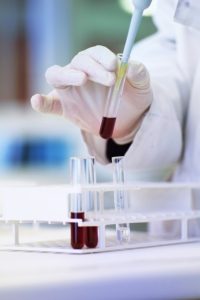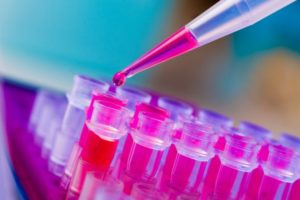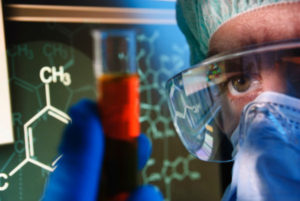Bay Biosciences provides high quality, clinical grade FFPE tissue blocks bio-samples with matching sera (serum), plasma and peripheral blood mononuclear cells (PBMC) biofluid specimens from patients with Thymus cancer. The sera (serum), plasma and PBMC biofluid samples are centrifuged from patient’s peripheral whole-blood using customized processing protocols. The human thymus bio-specimens are collected from unique thymus cancer patients and provided to a valued pharmaceutical customer for research, development and drug discovery.
Thymus Overview
The Thymus gland is a specialized primary lymphoid organ of the immune system located in the upper front part of the chest behind the sternum and between the lungs, is only active until puberty. After puberty, the thymus starts to slowly shrink (atrophy) and become replaced by fat, its effect in “training” T lymphocytes to fight infections and even cancer lasts for a lifetime. Thymus gland plays an important role in immunoregulation, both in the immune system and endocrine system.
Thymosin is the hormone found in the thymus, and it stimulates the development of disease-fighting T cells. Within the thymus, Thymus cell lymphocytes or T-cells mature, T-cells are critical to the adaptive immune system, where the body adapts specifically to foreign invaders. In addition to their function in maintaining a balanced immune system, thymosin’s may play a significant part in the initiation of the aging process.
The Thymus gland is largest and most active during the neonatal and pre-adolescent periods. By the early teens, the thymus begins to decrease in size and activity and the tissue of the thymus is gradually replaced by fatty tissue. Nevertheless, some T cell development continues throughout adult life.

Thymus Cancer
Cancer that starts in the thymus is rare, with fewer than one case per 100,000 patients diagnosed in the United States each year. The cause of this cancer type remains unclear. Cancers of the thymus are generally one of three types, Thymoma, Thymus carcinoma (also known as type C thymoma) and Thymus carcinoid (neuroendocrine) tumor which is more rare compared to Thymoma and Thymus carcinoma.
The two main kinds of thymus cancers, thymoma and thymic carcinoma, and both are rare. Thymomas and thymic carcinomas are rare tumors of the cells that are on the outside surface of the thymus. The tumor cells in a thymoma look similar to the normal cells of the thymus, grow slowly, and rarely spread beyond the thymus. On the other hand, the tumor cells in a thymic carcinoma look very different from the normal cells of the thymus, grow more quickly, and have usually spread to other parts of the body when the cancer is found. Thymic carcinoma is more difficult to treat than thymoma.
Thymoma
Most thymus cancers are thymoma. Cancer cells develop on the gland’s surface and appear similar to normal thymus cells. Thymoma grows slowly, rarely spreading beyond the thymus. Thymoma has been linked to the following autoimmune conditions. Treatment for these following conditions may lead doctors to discover the thymoma.
Thymoma is linked with Myasthenia Gravis (MG) and many other autoimmune diseases.
Patients with thymoma often have the following autoimmune diseases as well, these autoimmune diseases cause the immune system to attack healthy tissue and organs;
- Myasthenia Gravis (MG)
- Acquired Pure Red Cell Aplasia.
- Hypogammaglobulinemia
- Polymyositis
- Lupus Erythematosus
- Rheumatoid Arthritis
- Thyroiditis
- Sjogren Syndrome
Thymus Carcinoma (Type C Thymoma)
Less than 1 percent of thymus cancers are thymus carcinoma. Cancer cells develop on the thymus gland’s surface, but unlike thymoma, these cancer cells look very different from normal cells, are aggressive and tend to grow and spread quickly. Thymus carcinoma is more challenging to treat and has a higher rate of recurrence. Thymus carcinoma is divided into subtypes, depending on the cell type in which the cancer began.
Thymus Carcinoid (neuroendocrine) Tumor
Carcinoid or neuroendocrine tumors are called cancer in slow motion because they start small and grow slowly. Thymus carcinoid tumors account for 5 percent of thymus cancers. About 25 percent of thymus carcinoids occur in patients with a genetic syndrome called multiple endocrine neoplasia Type 1 (MEN1) syndrome.
Another cancer type associated with the thymus is Lymphoma. The thymus produces white blood cells called T-lymphocytes, which help protect the body from infection. If lymphocytes become cancerous, they can develop into lymphoma.
Signs and Symptoms of Thymus Cancer
Thymus cancers don’t typically cause symptoms, often the symptoms can mistakenly be attributed to a cold or flu. Following are some of the initial signs and symptoms of Thymus cancer:
Carcinoid tumors in the thymus sometimes release hormones that may cause symptoms, including:
Diagnosis of Thymus Cancer
Getting the right diagnosis is key to receiving the best treatment and outcomes for cancer. Discovery of thymus cancer often occurs incidentally, through testing such as a chest x-ray or treatment for other conditions such as autoimmune disorders. Diagnosis requires a biopsy, in which a small sample of the suspicious tissue is removed and examined under a microscope. Various ways to diagnose the thymus include:
- Fine-Needle Aspiration (FNA): This is a biopsy procedure where a thin needle removes a sample of tumor cells from the affected area.
- Core Biopsy: In this procedure wide needle is used to remove a larger sample of tumor cells from the affected or suspected area.
- Mediastinoscopy: A thin, tube-like instrument called mediastinoscope, with a light and viewing lens is inserted through an incision at the base of the neck above the breastbone. Tissue samples can be taken from the thymus and/or nearby lymph nodes.
- Mediastinotomy (Chamberlain Procedure): A tube inserted through an incision on the side of the breastbone is used to view the thymus. A biopsy tissue may be taken from the thymus and nearby lymph nodes.
- Video-assisted Thoracoscopic Surgery (VATS): This is a minimally-invasive procedure involving only small incisions, through which a tiny camera (thoracoscope) and surgical instruments are passed, allowing surgeons to operate inside the chest, guided by the video transmitted to a monitor. VATS is used for both diagnosing (biopsy) and treating thymus cancers.
Other diagnostics tests may include:
- Computed Tomography (CT) Scan: X-rays are taken from various angles and assembled by computer to produce detailed pictures inside the body. Sometimes a dye is injected to help certain organs or tissue show up more clearly.
- Magnetic Resonance Imaging (MRI) Scans: A magnet, radio waves and computer are used to create detailed pictures inside the body to identify the disease.
- Positron Emission Tomography (PET) Scan: A small amount of radioactive glucose is injected into a vein and a scanner rotates around the body taking pictures. Malignant cells appear brighter in the scan because they use more glucose.
- Octreotide Scan (OctreoScan): A small amount of radioactive octreotide (a hormone that attaches to certain tumors) is injected into a vein and a special camera captures the radioactivity to reveal the tumor.

Detailed clinical data, biomarker & genetic information including MRI, PET, CT scan results, FNA biopsy, pathology annotations, associated with the Thymus cancer patient’s specimens is provided to a valued customer for drug discovery, development and research. The Thymus cancer sera (serum), plasma and PBMC samples were processed using customized processing protocols provided by the researcher.
Bay Biosciences is a global leader in providing researchers with high quality, clinical grade, fully characterized human tissue samples, bio-specimens and human bio-fluid collections from cancer (tumor) tissue, cancer sera (serum), cancer plasma, cancer PBMC and human tissue samples from most other therapeutic areas and diseases.
Bay Biosciences maintains and manages it’s own bio-repository, human tissue bank (biobank) consisting of thousands of diseased samples (specimens) and from normal healthy donors available in all formats and types. Our biobank procures and stores fully consented, deidentified and institutional review boards (IRB) approved human tissue samples and matched controls.
All our human human tissue collections, human specimens and human bio-fluids are provided with detailed samples associated patient’s clinical data. This critical patient’s clinical data includes information relating to their past and current disease, treatment history, lifestyle choices, biomarkers and genetic information. Patient’s data is extremely valuable for researchers and is used to help identify new effective treatments (drug discovery & development) in oncology, other therapeutic areas and diseases. This clinical information is critical to demonstrate their impact, monitor the safety of medicines, testing & diagnostics, and generate new knowledge about the causes of disease and illness.
Bay Biosciences banks wide variety of human tissue samples and biological samples including cryogenically preserved -80°C, fresh, fresh frozen tissue samples, tumor tissue samples, FFPE’s, tissue slides, with matching human bio-fluids, whole blood and blood derived products such as serum, plasma and PBMC’s.
Bay Biosciences is a global leader in collecting and providing human tissue samples according to the researchers specified requirements and customized, tailor made collection protocols. Please contact us anytime to discuss your special research projects and customized human tissue sample requirements.
Bay Biosciences provides human tissue samples (human specimens) from diseased and normal healthy donors; including peripheral whole-blood, amniotic fluid, bronchoalveolar lavage fluid (BAL), sputum, pleural effusion, cerebrospinal fluid (CSF), serum (sera), plasma, peripheral blood mononuclear cells (PBMC’s), saliva, Buffy coat, urine, stool samples, aqueous humor, vitreous humor, kidney stones, renal calculi, nephrolithiasis, urolithiasis and other bodily fluids from most diseases including cancer. We can also procure most human bio-specimens and can do special collections and requests of human samples that are difficult to find. All our human tissue samples are procured through IRB approved clinical protocols and procedures.
In addition to the standard processing protocols Bay Biosciences can also provide human plasma, serum, PBMC bio-fluid samples using custom processing protocols, you can buy donor specific sample collections in higher volumes and specified sample aliquoting from us. Bay Biosciences also provides human samples from normal healthy donors, volunteers, for controls and clinical research, contact us Now.
日本のお客様は、ベイバイオサイエンスジャパンBay Biosciences Japan またはhttp://baybiosciences-jp.com/contact/までご連絡ください。


